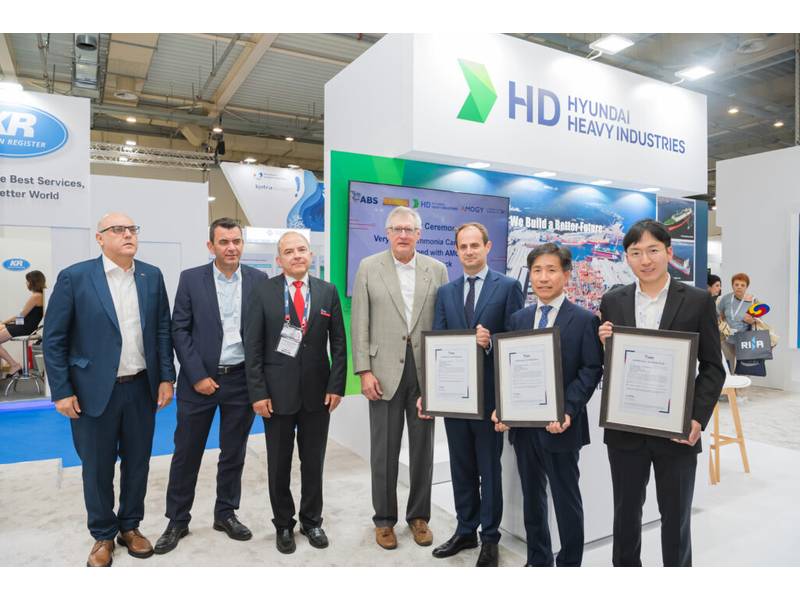ABS and Liberian Registry Greenlight HHI's Next-gen Ammonia Carrier Design
The American Bureau of Shipping (ABS) and the Liberian Registry are both granting approval in principle (AIP) to HD Hyundai Heavy Industries (HHI) and Capital Gas Ship Management (Capital Gas) for a very large ammonia carrier (VLAC) design. This innovative vessel design features the integration of Amogy’s carbon-free ammonia-to-electrical power system, marking a significant leap forward in sustainable maritime technology.
Amogy, ABS, the Liberian Registry, HHI, and Capital Gas joined forces to design a 93K CBM ammonia carrier with Amogy’s technology providing ~1400 kW of auxiliary power equivalent to a diesel generator. Amogy’s ammonia-to-electrical power system splits, or “cracks,” liquid ammonia into its base elements of hydrogen and nitrogen, which then funnels the hydrogen into a fuel cell, generating high-performance power without carbon emissions.

For these AIPs, announced this week at Posidonia 2024, ABS and the Liberian Registry have confirmed the feasibility of Amogy’s technology as per relevant regulatory guidelines for deployment onboard a very large ammonia carrier.
Patrick Ryan, ABS Senior Vice President and Chief Technology Officer, said, “ABS is proud to use our expertise as the world’s leading classification society for gas carriers to support the development of next-generation vessels like this one. With today’s rapid pace of emerging technologies, Class support is critical right now. Safety in the maritime industry is paramount while working together on a smooth transition to clean energy.”
Thomas Klenum, Executive Vice President for Innovation & Regulatory Affairs of the Liberian Registry, said, “The IMO GHG Strategy adopted last year by MEPC 80 set forth ambitious targets for international shipping to reach net-zero GHG emissions by 2050. To achieve this, we need forward-thinking stakeholders to collaborate on identifying innovative and sustainable solutions, and this is exactly what this project between Amogy, HHI, Capital Gas, ABS, and the Liberian Registry demonstrates by integrating the innovative Amogy system into HHI’s 93K VLAC design. This project greatly supports paving the way to net-zero GHG emissions, and we are proud to award the AIP.”
Seung-Ho Jeon, Senior Executive Vice President and Chief Technical Officer of HD Hyundai Heavy Industries, said, “As international environmental regulations tighten and the trend towards high-value-added ships in the maritime sector continues, there is growing demand for vessel performance that guarantees efficiency and eco-friendliness. While ammonia is gaining attention as a carbon-free fuel, its strong toxicity requires utmost safety.
“Through this JDP, we have analyzed the safety of fuel cells on very large ammonia carrier, bringing us a significant step closer to achieving the IMO net-zero GHG emission strategy by 2050.
“We look forward to continuing our collaboration with Amogy, Capital Gas, ABS and the Liberian Registry to drive innovation and progress in the field of sustainable maritime technology.”
Miltos Zisis, Managing Director, Capital Gas Ship Management, said, “We believe that ammonia will be crucial in advancing the transition towards an era of ‘net zero’ emissions. Our approach is forward-looking and highly receptive to innovative solutions, emphasizing sustainability.”
Seonghoon Woo, CEO at Amogy, said, “Receiving AIPs from ABS and the Liberian Registry for the integration of our innovative ammonia-to-power system on this ammonia carrier is a pivotal step toward the deployment of our technology. We look forward to further collaboration with ABS, the Liberian Registry, HHI, and Capital Gas as we seek to move this project forward and facilitate ammonia-powered solutions in the maritime industry.”
